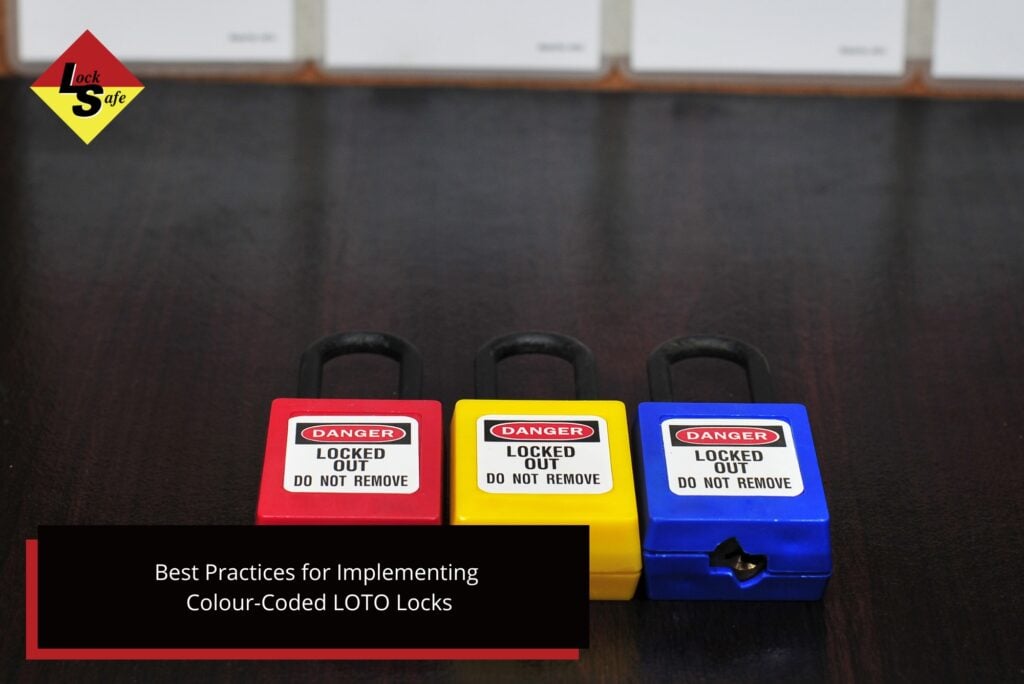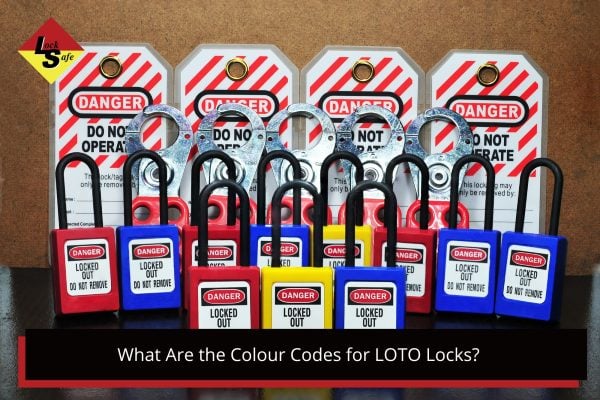Lockout-Tagout (LOTO) is a critical safety procedure that protects workers from hazardous energy sources when maintaining or servicing equipment. One of the most important elements of an effective LOTO system is the colour-coding of padlocks. Colour-coded locks help identify who has locked out equipment and for what purpose, reducing the risk of confusion and improving workplace safety.
In this article, we explore why LOTO locks are colour-coded, the different lock colours and their uses, and best practices for implementing a structured LOTO system in the workplace.

Why Are LOTO Locks Colour-Coded?
In workplaces where multiple teams work on machinery, it is essential to have clear identification systems to prevent accidental equipment activation. If all LOTO locks were the same colour, it would be difficult to determine who applied a lock, why it was applied, and when it could be removed.
Colour coding ensures that each lock serves a distinct purpose, allowing workers to quickly recognise which locks belong to specific individuals, teams, or roles. This improves organisation, reduces risks, and ensures compliance with workplace safety standards.
Benefits of Colour-Coded LOTO Locks
- Helps prevent accidental removal of locks
- Clearly differentiates roles and responsibilities
- Improves efficiency by reducing delays and confusion
- Supports compliance with WorkSafe Australia safety standards
By assigning specific colours to different functions, workplaces can create a well-organised lockout system that enhances overall safety and efficiency.
LOTO Lock Colour Codes and Their Uses
While there is no universal standard, most Australian workplaces follow best practices that align with WorkSafe Australia guidelines. The following are some of the most used colours and their meanings.
🔴 Red – Personal Safety Lockout
Red locks are the most recognised LOTO locks and are typically assigned to individual workers. When a technician applies a red lock, only they can remove it, ensuring their safety while working on a machine.
Example use: A machine operator isolates a conveyor belt for maintenance and applies a red lock to prevent unexpected reactivation.
🔵 Blue – Contractor or External Worker Locks
Blue padlocks are often used by contractors or external maintenance teams who are not part of the permanent workforce. This distinction allows companies to track the work of external personnel and ensure lockout procedures remain organised.
Example use: A contracted electrician working on an industrial air conditioning system applies a blue lock to differentiate their work from in-house employees.
🟢 Green – Equipment-Specific Locks
Green locks are sometimes used for equipment-specific lockouts. These locks may indicate additional safety precautions for specific machinery that requires special handling or unique maintenance steps.
Example use: A high-pressure pump is locked out with a green padlock to ensure additional safeguards before servicing.
🟡 Yellow – Group Lockout or Shared Worksites
Yellow locks are used in group lockout procedures where multiple employees must isolate the same machine. These locks ensure that all team members remove their individual locks before the equipment is re-energised.
Example use: A team of electricians performing maintenance on a switchboard applies personal locks, while a yellow lock remains in place until all workers have completed their tasks.
🟠 Orange – Supervisor or Verification Locks
Orange padlocks are often assigned to supervisors or safety officers who oversee the lockout process. These locks may be used for verification before equipment is restarted or as an extra level of control.
Example use: A site manager places an orange lock on an isolated machine to confirm all safety steps are completed before reactivating it.
🟣 Purple & Black – High-Risk Electrical or Hazardous Energy
Purple and black locks are commonly used for high-risk energy sources, such as high-voltage electrical panels or hazardous materials. These locks indicate extreme danger and are typically restricted to authorised personnel.
Example use: An electrician applies a black lock to a high-voltage panel to warn workers of the potential hazard before servicing.
Ensuring consistency in colour coding across the workplace is key to a successful LOTO program. When everyone understands what each colour means, the risk of miscommunication is minimised, and safety procedures become second nature.
Best Practices for Implementing Colour-Coded LOTO Locks
A well-implemented colour-coded LOTO system ensures workplace safety, minimises risks, and maintains compliance with industry regulations. To achieve this, businesses should standardise colours across all teams, ensuring each colour has a clear, defined purpose. Employees and contractors must receive regular training on lockout procedures, colour meanings, and authorisation protocols.
Adding engraved labels or department identifiers to locks enhances clarity and prevents misuse. Regular audits should be conducted to verify compliance, address inconsistencies, and replace damaged or outdated locks. Finally, investing in high-quality, durable padlocks, such as the LS410 Master Lock Padlocks, ensures long-term reliability in industrial environments. You can also find more secure options in our full padlocks and storage range, , suitable for all lockout and isolation systems.
Key steps for effective implementation:
- Standardise lock colours
- Train employees
- Label locks
- Conduct regular
- Use high-quality locks
By following these best practices, businesses can create a structured, efficient LOTO system that enhances workplace safety and prevents hazardous energy incidents.

Need Help Choosing the Right LOTO Locks?
A well-structured LOTO lock colour system helps create a safer and more organised workplace. Whether you need to introduce a new lockout procedure or improve your existing system, LockSafe can assist. Call us at +61 (0)8 9455 7255 our team is ready to help you find the right safety solutions for your business.













